Mary Anne Yarde's Blog: The Coffee Pot Book Club , page 94
April 15, 2020
Check out Anna Campbell's fabulous book — The Highlander’s English Bride #HistoricalRomance #MustRead @AnnaCampbelloz

The Highlander’s English BrideThe Lairds Most Likely Book 6By Anna Campbell

An impossible pairing…
Hamish Douglas, the mercurial Laird of Glen Lyon, has never got along with independent, smart-mouthed Emily Baylor. Which wouldn’t matter if this brilliant Scottish astronomer didn’t move in the same scientific circles as Emily and if her famous father wasn’t his mentor. But when Emily looks likely to derail the event which will make Hamish’s career, he loses his temper with the pretty miss and his recklessness leaves her reputation in ruins.
A marriage made in scandal…
Emily has always thought her father’s spectacular protégé was far too arrogant for his own good. But what is she to do when the only way she can save her good name in society is to wed the unruly laird? Reluctantly she accepts Hamish’s proposal, but only on the condition that their union remains chaste. That shouldn’t be a problem; they’ve never been friends, let alone potential lovers – except that after they marry, Hamish reveals unexpected depths and a host of admirable qualities, and he’s so awfully handsome, and now the swaggering rogue admits that he desires her…
From the ballrooms of London to the grandeur of the western Highlands, a battle royal rages between these two strong-willed combatants. Neither plans to yield an inch – but are these smart people smart enough to see that sometimes the greatest victory lies in mutual surrender?
Excerpt
London, late October, 1822
Emily gestured for Hamish to sit, accepting that she wasn't going to throw him out. Raising her chin, she injected false cheerfulness into her tone. "It will all blow over."
He didn't shift from where he stood. "No. I don't think it will."
Nor did she. Not really.
Feeling cornered, she backed away and curled one hand over the back of the chair she'd been sitting in. "We didn't do anything wrong."
No trace of his usual smile lit the deep blue eyes he leveled on her. Nor did he sit down, which meant he still loomed over her like a mighty cliffside. "The world sees it differently."
She sliced the air with a dismissive hand. "I'm a spinster lady past marriageable age and up until this point, I've had a spotless reputation. Outside the scientific community, nobody even knows I'm alive."
She hid a wince as more of that dratted compassion softened his gaze. Hamish Douglas would not feel sorry for her. She would not permit him to.
"The scientific community includes many of society's darlings. Only the great and the good have the money to dabble in arcane matters like the discovery of comets."
A realization struck her, and not a particularly pleasant one at that. "You're worried for your own reputation."
He didn't even flinch. "I am indeed. I hope one day to be Astronomer Royal. At the very least, I plan to spend the rest of my life working with the men who witnessed our downfall."
She wanted to object to his use of the word "men," but they both knew how few women carved out a scientific career. Influence in London's intellectual circles was a masculine prerogative.
"I'm sorry your ambition has suffered a minor setback," she said with a hint of sarcasm.
"Hardly minor. A man with a dishonored name is unlikely to reach the peak of acclaim. Don't mistake me. I also care about the damage to your name. These things are always worse for the lady, however much I wish that wasn't the case. But nor am I blind to the harm all this talk will do to my hopes."
Emily hid another wince. She felt small for mocking him.
As a woman, she'd always be an outsider in the scientific community, however clever she was. Hamish had started with a disadvantage that was almost as fatal. He was Scottish, and he'd arrived in London with no connections in the world he aspired to dominate. But because he was a man and because he had an exceptional brain, he'd made his way so successfully that when he spoke of becoming Astronomer Royal, it didn't sound like hubris.
"I'm sure they'll forgive you in time. You just need to keep your nose clean from here on in."
With visible regret, he shook his head. "They'll forgive me after I make amends for my sins."
She frowned. "Are you going away until it all dies down?"
"That would be something."
"So you're here to say goodbye to Papa?" Both of them knew that if Hamish went into extended exile, Sir John Baylor wouldn't live to see his return.
She felt a pang at the idea of him going. Which was mad when he'd caused her so much trouble.
Hamish's chiseled jaw set in a determined line, and a muscle flickered in his lean cheek. "No."
"I'm sure he wouldn't mind if I woke him. He always loves to see you. Although I'm not sure how alert he'll be."
One large, capable hand made a sweeping gesture. "Yes, I'll need to talk to him. But, Emily…Miss Baylor, you misunderstand me. I'm not here to say goodbye. I'm here to ask you to become a permanent part of my life."
Oh, no… Not this. Not this.
Her knees turned to water, and she gripped the back of the chair so tightly that her knuckles went white. Icy dread trickled down her backbone. Surely he couldn't mean what she feared he did. "Hamish, I…"
He rushed on before she could finish. Nor did he sound any happier to say what he did than she was to hear it. "Miss Baylor, I'd count myself the luckiest man in England if you will consent to become my wife."
Pick up your copy ofThe Highlander’s English BrideAmazon UK • Amazon US • Amazon AU • iBooks • Kobo
Anna Campbell
 Anna Campbell is an Australian historical romance writer. She’s published 11 multi award-winning novels for Avon and Grand Central, and 24 books as an independent author. Her books have been translated into 24 languages. She’s currently working on a series featuring roguish Highland heroes, called the Lairds Most Likely. The Laird's Willful Lass, The Laird's Christmas Kiss, The Highlander’s Lost Lady, The Highlander’s Defiant Captive, The Highlander’s Christmas Quest, and The Highlander’s English Bride. Look out for The Highlander’s Rescued Maiden later in 2020.Connect with Anna: Website • Facebook • BookBub • Goodreads • Amazon Author Page.
Anna Campbell is an Australian historical romance writer. She’s published 11 multi award-winning novels for Avon and Grand Central, and 24 books as an independent author. Her books have been translated into 24 languages. She’s currently working on a series featuring roguish Highland heroes, called the Lairds Most Likely. The Laird's Willful Lass, The Laird's Christmas Kiss, The Highlander’s Lost Lady, The Highlander’s Defiant Captive, The Highlander’s Christmas Quest, and The Highlander’s English Bride. Look out for The Highlander’s Rescued Maiden later in 2020.Connect with Anna: Website • Facebook • BookBub • Goodreads • Amazon Author Page.
Published on April 15, 2020 20:00
April 14, 2020
#BookReview — Forged By Iron Olaf's Saga Book 1) by Eric Schumacher #HistoricalFiction #Vikings @DarkAgeScribe

Forged By Iron(Olaf's Saga Book 1)By Eric Schumacher

From the bestselling author of Hakon’s Saga comes Forged by Iron, the first in a series of thrilling tales about Olaf Tryggvason, one of the most legendary and enigmatic kings of the Viking Age.
Norway, AD 960.
The fabric that has held the Northern realm together is tearing. The sons of Erik Bloodaxe have returned and are systematically killing all opposition to the High Seat. Through treachery, Harald Eriksson slays Jarl Trygvi, an heir to the throne, and then comes for Trygvi’s wife, Astrid, and son, Olaf.
Astrid and Olaf flee their home with the help of Astrid’s foster father, Torolv Loose-beard, and his son, Torgil, who are oath-sworn to protect them. The group escapes east, through the dark, forested land of the Swedes and across the treacherous East Sea, all the while evading the clutches of Harald’s brutal henchmen.
But the gods are fickle and the group is torn apart, forcing them to fend for themselves in Forged by Iron, a must-read for all who enjoy action-packed historical fiction.

"Oaths are like iron, Torgil," whispered my father as we watched the king embrace my former foster sister. "You cannot break them..."
King Trygvi had put his eight-year-old son's welfare into the hands of Torgil, son of Torolv. At twelve-years-old Torgil had felt honoured with the responsibility but right now when he saw that mischievous light in his young charges eyes he could only fear what Prince Olaf's playfulness would mean for him — a reprimand from the king, no doubt, and a lash from his father. But, Torgil would honour the oath, no matter what fate might have installed for him and Olaf.
From a witless leap into the cold and unforgiving sea to a battle that would end in either freedom or death, Forged By Iron (Olaf's Saga Book 1) by Eric Schumacher is the unforgettable story about a young boy's determination to honour his oath no matter what the circumstances.
With the dedicated devotion of a Skald and a novelist intuition for what makes a book entertaining, Schumacher has presented his readers with a novel that is as impressive as it is mesmerising. Forged by Iron (Olaf's Saga Book 1) is a story of betrayal, torment, suffering, and a deep and unbreakable friendship. It is the tale of two children who by oath find themselves forever beholding to each other. It is, in all ways, a richly detailed and emotionally charged story that leaves a reader gasping and begging for more.
Schumacher evokes such a strong sense of place and time in all of his books, and this one is no exception. His attention to the historical detail as well as the documented sources of Olaf's life has to be commended. The hours of research that went into this story is evident in the crystalline prose and enthralling storyline. Schumacher skillfully weaves historical fact with a little creative licence to pen a tale that is not only wonderfully developed but also one that is utterly captivating from start to finish. Schumacher is an author that makes history come alive in all of its glory and disasters. If this were the time of the Skald's, then Schumacher would have been in much demand in the Mead Halls.
With one eye on the history and the other on what entertains a reader, Schumacher has written his best book yet. Told through the eyes of young Torgil, Schumacher tells a story that is as heart-rendering as it is desperate. Torgil is a fabulously drawn protagonist whom a reader can get behind and root for. Torgil has two great gifts which sees him through some of the darkest of days — he knows when to keep silent, but he is also made of the strongest mettle. Events happen in this story that would break a man, let alone a child, but Torgil's determination and pig-headed grit to not only survive but take control of the situation made him so very likeable.
Breaking with historical fact, Schumacher decided to introduce us to Olaf slightly earlier than what the saga about this man state. I can understand his reason for doing so, and with regards to this story and these characters, it worked incredibly well. It gives the friendship between Olaf and Torgil a sense of authenticity — together they face some life-changing events that take them on an unexpected journey of hardship and suffering. This made their bond, and the oath so much more durable and realistic.
At the beginning of this tale, Olaf is a cheeky little boy, who like many children want to take part in what their older counterparts are doing. Olaf also has a reckless attitude to life — he is yet to realise he is not immortal. There is also a little arrogance to his personality — he is a prince, and he knows it. However, when his father is betrayed most dreadfully, Olaf unwittingly turns to Torgil. Olaf's relationship with Torgil changes through the course of this book. They become uncommonly close, and there is nothing one would not do for the other. I thought Olaf's depiction was marvellous. I really enjoyed reading about him.
There are several antagonists in this book, from the traitorous Holger to the vile and cruel Klerkon. But it was Heres' depiction that made my skin crawl. Heres is a despicably wicked man who torments our brave protagonists so very cruelly. I despised this character so much. He is the cause of so much suffering, and his disregard for life is disgustingly vile. Saying that, however, Heres really drives this story forward. Although this story is told by Torgil, it is the antagonists that control the narrative and the fate of these boys. One thing is for sure, Schumacher really knows how to pen a good villain.
Forged By Iron (Olaf's Saga Book 1) by Eric Schumacher is a book that begs to be read in one sitting. It demands your attention and is worthy of a place on your bookshelf. When historical fiction is written in such a way, then there is no such thing as too much. Book 2 cannot come soon enough.
I Highly Recommend.
Review by Mary Anne Yarde.The Coffee Pot Book Club.
Pick up your copy ofForged By IronAmazon UK • Amazon US
Eric Schumacher
 Eric Schumacher was born in Los Angeles in 1968 and currently resides in Santa Barbara, CA with his wife, two children, and dog. He is the author of three historical fiction novels set in the Viking Age: God’s Hammer, Raven’s Feast, and War King. All tell the story of the first Christian king of Viking Norway, Hakon Haraldsson, and his struggles to gain and hold the High Seat of his realm. For more information on Mr. Schumacher or to read more of his blog posts about the Viking Age, please visit is website.
Eric Schumacher was born in Los Angeles in 1968 and currently resides in Santa Barbara, CA with his wife, two children, and dog. He is the author of three historical fiction novels set in the Viking Age: God’s Hammer, Raven’s Feast, and War King. All tell the story of the first Christian king of Viking Norway, Hakon Haraldsson, and his struggles to gain and hold the High Seat of his realm. For more information on Mr. Schumacher or to read more of his blog posts about the Viking Age, please visit is website.Connect with Eric: Website • Twitter • Facebook • Goodreads.
Published on April 14, 2020 21:00
Check out Gretchen Jeannette's fabulous book — A Devil of a Time #HistoricalRomance #American #HistoricalFiction @GAJeannette
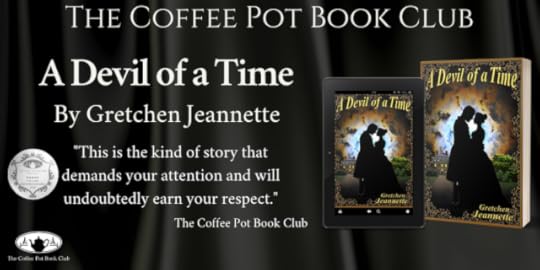
A Devil of a TimeBy Gretchen Jeannette

Captain Niall McLane might think he has survived the worst that could happen to any man, but as the bloody American Revolution draws to a close, he finds his troubles are just beginning. When Niall becomes a suspect in a grotesque murder, his reputation as a merciless Indian fighter and scalp hunter turns the public against him. Worse, the real killer has only begun to rampage, his sights set on those close to Niall.
Now the hunt for evil is on. Niall's only allies are Andrew Wade, a hopeless drunkard tormented by his act of cowardice, and Andrew's young wife, Clarice, a woman of mettle who captivates Niall’s heart. After another murder occurs, Niall manages to stay out of jail, but can he protect Clarice from the formidable creature prowling in their midst?
From the mysterious forests of Kentucky to a graceful Virginia plantation, from the fevered heat of battle to the passionate struggle for renewal, A Devil of a Time weaves a tale of courage, betrayal, and forbidden love, of three men grappling with the demons of their past, and the remarkable woman destined to change all their lives forever.
Excerpt
Shortly after supper, Niall slipped outside onto the veranda behind the mansion. A full moon shone through the treetops, bathing the world in opalescent light. Taking refuge in a shadowy corner beyond the spill of lantern glow, he drank in the splendor of Polly’s parklike estate. A luxuriant formal garden, extending from the veranda to the back of the property, encompassed a full acre of gently undulating grounds. Secluded pathways offered an escape into tranquility, winding among beds of native wildflowers, exotic shrubs, and ornamental trees, many in bloom. He could hear the music of a flute wafting through the night. Recognizing the light, silvery notes of a Handel sonata, he grimaced, for the song signaled the start of an amusement of paramount importance to this gathering: dancing.
On Polly’s orders, the musicians would commence with a round of four minuets, followed by a French cotillion in honor of her military guests. Once the ceremony of skilled footwork and dexterity concluded, the jigs, reels, and country dances would follow.
I cannot wait to show you off.
Niall scowled in the dimness, envisioning a catastrophe of missteps and lost rhythm, of Polly scolding him for not paying attention during his lessons. He turned as the veranda door opened, fully expecting to see Polly or a servant sent to summon him.
Clarice stepped outside. Scanning the veranda, she spied his figure cloaked in shadows, and although she could not make out his face, she knew him by a host of sensuous details. When he walked forward into the light, she caught the full view of his handsome appearance. Her body’s response to his nearness was immediate, unnerving in its intensity. “Have you seen Andrew?” she asked.
“Not for a while.”
“I’ve looked all over for him. I don’t know where he could be.”
“They’re playing cards in the upstairs sitting room. Did you look there?”
“No, I didn’t,” she said, wondering how intimately he knew the upstairs chambers of Polly’s house. “That must be where he went.”
“I’ll go have a look.”
“Please don’t trouble yourself. He’ll make his appearance eventually.” After a momentary silence, she ventured, “Are you getting some air?”
“I’m hiding from Polly.”
She smiled in surprise. “Why, pray tell?”
Just then, the opening notes of Bach’s Minuet in G Major floated through the air, prompting his reply, “That’s why. The minute I go back inside, she’ll want me to dance.”
“You make it sound like a punishment.”
“It is when you have two left feet.”
Then Clarice realized he was suffering from nervousness. This courageous man, who had battled scalp hunters in the deep woods, whose ferocious aggression helped turn the tide in a bloody Yorktown redoubt, was terrified of dancing before this crowd. That he made no effort to hide his apprehension touched her deeply. “You do not,” she chided. “I saw you dance on Twelfth Night. Anyway, no one cares if you miss a step.”
“Polly cares.”
At that, Clarice yielded to a sudden impulse to banish Polly Stewart from his mind. “Dance with me,” she invited in a soft voice. “Let me see how you do.”
Niall started to decline, but then she drew near enough that the fragrance of her perfume invaded his senses. With the strains of a romantic melody stirring his blood, he watched her gather her skirts and dip a low curtsy. Thus persuaded, he bowed in response. The next thing he knew, their hands were joined, her palm warm against his skin. As he guided her into the first figure of the dance, the steps he had once trudged through came naturally, almost without conscious thought, enabling him to savor the passion of her movements. Like a mystical princess endowed with enchantment, she seemed to float across the veranda, commanding in her beauty and grace. Whether she was dancing by his side or slowly wheeling away or gliding forward in refined steps to clasp his hand, he found he was not merely performing with her but engaging in a kind of courtship under the starry heavens. With each touch, with every look exchanged, he matched the intensity in her eyes, beguiled by the lure of the forbidden that made her so unspeakably desirable. When the music dwindled through the final refrain, signaling the end of their communion, he cursed Bach for not writing a longer piece.
He faced her for the closing honors, bowing as she curtsied.
“You dance beautifully,” she said.
“You inspired me.” He kept his smile correct and polite, no easy feat with her standing within arm’s reach. “I had no idea the minuet could be so enjoyable.”
A blush of pleasure suffused her face. “I think you’re ready to face the public.”
He felt ready to take on the world. When he offered his arm, she accepted without hesitation, and together they returned to the ball.
Pick up your copy ofA Devil of a TimeAmazon UK • Amazon US
Gretchen Jeannette
 Gretchen lives and works in Chester County, Pennsylvania, an area rich in Revolutionary War and Colonial American history. Her enduring interest in 18th Century America began at a young age, inspired by tales of adventure, romance, and early American lore. After working as an editor for a small publishing company, she decided to write a story of her own. So began a journey fueled by her passion for breathing life into history through believable characters, authentic historical details, and stories woven with romance, action, and adventure.
Gretchen lives and works in Chester County, Pennsylvania, an area rich in Revolutionary War and Colonial American history. Her enduring interest in 18th Century America began at a young age, inspired by tales of adventure, romance, and early American lore. After working as an editor for a small publishing company, she decided to write a story of her own. So began a journey fueled by her passion for breathing life into history through believable characters, authentic historical details, and stories woven with romance, action, and adventure.Connect with Gretchen: Website • Twitter • Goodreads.
Published on April 14, 2020 20:00
April 13, 2020
#BookReview — A Thin Porridge by Benjamin Gohs #HistoricalFiction #Thriller @BenGohs

A Thin PorridgeBy Benjamin J. Gohs
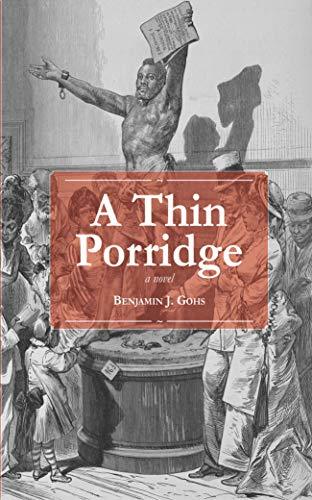
When 19-year-old Abeona Browne's renowned abolitionist father Jon Browne dies in summer of 1860, devastating family secrets are revealed, and her life of privilege and naiveté in Southern Michigan becomes a frantic transatlantic search for someone she didn't even know existed.
Still in mourning, Abeona sneaks aboard the ship carrying her father’s attorney Terrence Swifte and his assistant Djimon—a young man with his own secrets—on a quest to fulfill a dying wish.
Along the journey, Abeona learns of her father’s tragic and terrible past through a collection of letters intended for someone he lost long ago.
Passage to the Dark Continent is fraught with wild beasts, raging storms, illness, and the bounty hunters who know Jon Browne’s diaries are filled with damning secrets which could threaten the very anti-slavery movement he helped to build.
Can Abeona overcome antebellum attitudes and triumph over her own fears to right the wrongs in her famous family’s sordid past?
A Thin Porridge is a Homeric tale of second chances, forgiveness, and adventure that will whisk readers from the filth of tweendecks, into the treachery of Cameroons Town, across the beauty of Table Bay, and deep into the heart of the fynbos—where Boer miners continue the outlawed scourge of slavery.

"There lies dying, at this very moment, a man of a certain repute, of whom readers shall soon be shocked to learn is as undeserved as the truth is surprising…"
But no one would be as shocked as his daughter, Abeona Browne.
It is said that you never really know someone, and yet, Abeona had been so sure of her father, Jon Browne. He was her world, her everything, but now he has gone on to higher things and has left Abeona with a terrible realisation that she had never really known him at all.
Through his diaries, Abeona discovers a dark past. It is one of suffering, slavery, unexpected power, sacrifice and death. As her father falls off the pedestal that she had so carefully placed him upon, Abeona is determined that what she has discovered will remain a secret forever. However, there are those who will go to any length to discredit a renowned abolitionist, and they will follow her to the very plains of Africa to do so.
From a tragic death to an adventure of a lifetime, A Thin Porridge by Benjamin J. Gohs is the story of one young woman's fight to not only reunite her family but to save the abolitionist cause.
With a stirring narrative that left me fearing for the protagonist's life on more than one occasion and an almost crystalline prose that hooked me from the opening chapter, A Thin Porridge is the kind of book that readers of quality Historical Fiction can get very excited about. Set in both America and Africa in the 1800s, Gohs transports his readers to a new and dangerous world, where the sharks close in on their prey, and the lions sharpen their claws in preparation for the hunt. Gohs has breathed new life into a world where an economy ran on the suffering of human misery. He has also demonstrated how one person could make a difference even in the face of impossible odds.
Gohs' tenacious devotion to the historical detail has to be commended. From Southern Michigan to the fynbos of South Africa, Gohs has given his readers a glimpse into a shameful past that is filled with suffering, abuse, but strangely also hope. With a vivid stroke of the quill, Gohs has captured the very essence of what Africa was like in the 1800s — from the despair of the slave market to the indisputable beauty of the endless grasslands. This is a book that also captures every single one of the senses. I could almost feel the heat of the midday sun, and the torment of the mosquitos. I could see the richness of the landscape and admire the majesty of the wildlife. Likewise, life on board the S.S. Elsie-Marie was depicted with an honest sense of realism. The squalor and almost prison-like treatment of those in steerage and the grandeur of life for those in first-class clearly demonstrated the vast difference in the social class structure during this time. I can only imagine the long hours of research that went into this book, but it was certainly worth it. Kudos, Mr Gohs. Kudos, indeed.
The heroine of this tale is the young Abeona Browne. In an era where her people were still slaves, Abeona's life had been one of privilege — yes, some white folk may well look down their noses at her and whisper behind their hands, but Abeona was as good as they were, as educated, as wealthy. However, despite her father's passion for his cause, she soon came to realise after his death, as to how much he had sheltered her from the darker side of human nature. Her belief in her own abilities and her seemingly irrevocable grief leads her to make some incredibly rash decisions which teach her some very harsh lessons not only about life but about racial inequality. This naïvety seemed, at times, almost out of place in a country which would soon be torn apart by a bloody civil war, however, I can understand why Gohs decided to portray Abeona in such a way — the shock when she experiences something far worse than a whisper behind a hand teaches her humility in a way no cold lecture could have ever effectively delivered. Initially, I have to admit, I found it incredibly hard to connect with Abeona. She certainly roused my sympathy with her seemingly unbearable grief, but her treatment of Uncle George and her rude and almost spiteful behaviour made her rather unlikeable. However, as the story progresses, as Abeona's eyes are opened, she becomes a protagonist that a reader can really get behind and root for. The situation that Abeona finds herself in means she has to mature very quickly, and it gives her a deeper appreciation of how fortunate she was to grow up, not only with her freedom but with a father who was influential to the abolitionist cause of freeing those in bondage. Although Abeona feels betrayed by her father's secrets, she will do everything possible to keep her father's secrets from ever being made public. Aboena could have given up her father diaries to those who are desperate to discredit him, but she knows that if she does, then everything he worked for would be put into jeopardy and that she could not allow. Aboena became a woman that I deeply admired, and her story is one I immensely enjoyed.
There are several secondary characters in this book, all of which have a part to play in this performance of lies, truths, and abolition. The ageing lawyer, Terence Swifte, is determined to deliver the diaries to the person whom Jon Browne had entrusted them to in his will despite what personal discomforts such an endeavour means for him. Likewise, he is equally committed to Abeona's welfare — even though that was not part of the original bequest! Likewise, Swifte's assistant, Djimon, also helps to drive this story forward. I thought Djimon depiction was absolutely fabulous. His and Aboena's relationship is complicated and wrapped up in a blanket of emotional uncertainty. Djimon becomes an unlikely hero as he battles not only to keep his employer alive but Abeona as well.
The antagonists in this novel bring something new and sinister to add to this story of discovery. I thought the portrayal of Dubious Grimmis was richly detailed in the telling as was the depiction of Mr Clovis, the King of Tweendecks, on board the S.S. Elsie-Marie.
A Thin Porridge by Benjamin J. Gohs is a book that keeps on giving. The hours flew by as I lost myself in this sprawling and emotionally poignant story of one young woman as she desperately battles to hide the truth while at the same time, trying hard to come to terms with it. This is the kind of book that demands your respect and certainly deserves a place on your bookshelf. I loved every minute of it.
I Highly Recommend.
Review by Mary Anne Yarde.The Coffee Pot Book Club.
Pick up your copy ofA Thin PorridgeAmazon UK • Amazon US
Benjamin Gohs
 Benjamin J. Gohs writes dark literary novels about sympathetic losers struggling to survive in a hostile world.
Benjamin J. Gohs writes dark literary novels about sympathetic losers struggling to survive in a hostile world.After graduating high school in 1993, Benjamin went on to work at just about everything from cooking and auto repair to dealing blackjack and being attacked by protection dogs.
In 2003, Benjamin began freelance writing and worked his way into a full-time reporter job in 2005 which led to his first editorship.
Benjamin now divides his time between writing novels and managing the print + digital community newspaper he co-founded in 2009.
Connect with Benjamin: Website • Twitter • Goodreads.
Published on April 13, 2020 21:00
#BookReview — Captain Kempton's Christmas by Jayne Davis #HistoricalRomance #RegencyRomance @jaynedavis142
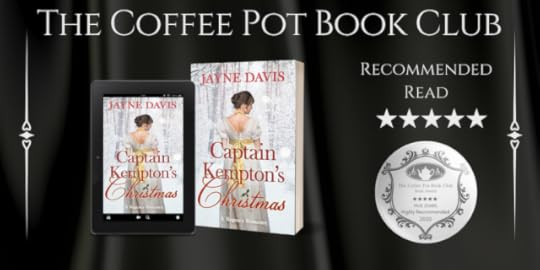
Captain Kempton's ChristmasBy Jayne Davis
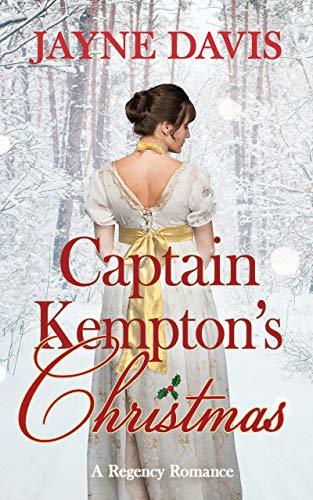
Lieutenant Philip Kempton and Anna Tremayne fall in love during one idyllic summer fortnight. When he’s summoned to rejoin his ship, Anna promises to wait for him.
While he’s at sea, she marries someone else.Now she's widowed and he's Captain Kempton. When they meet again, can they put aside betrayal and rekindle their love?
A sweet second-chance Christmas novella.

"Had he forgotten her so completely? Was that why he'd never answered her letters?"
In the long and lonely months while Anna Tremayne, now the recently widowed Lady Anna Radnor, had waited for word from Philip it had certainly felt like she had been forgotten.
Forgotten her? How Captain Philip Kempton wished he could forget the woman who had broken his heart. Anna had promised him she would wait, but not five minutes after he had put out to sea, Anna had married Lord Radnor, a man three times her age. At least now he knew what Anna really was — a fortune hunter.
An unfortunate set of circumstances means that Philip and Anna would be under the same roof this Christmas. Philip is determined to avoid her at all costs. However, what his head tells him to do and what his heart demands are two very different things altogether.
From a chance meeting at the Blue Bell Inn to the declaration of their long-suppressed love. Captain Kempton's Christmas by Jayne Davis is a tender, emotional story set within the romantic backdrop of a Regency Christmas.
With careful attention to the festive historical detail, this charming novella is perfect for a cold winter's day. The narrative is fresh and compelling, which made this story absolutely irresistible. This book is a real Christmas treat for fans of Regency Romance.
Anna is a fabulous heroine. She tries to keep her feelings for Philip concealed beneath her calm and composed exterior. However, every time Anna glances his way, she feels the grief of a long lost love. With Philip's cold indifference and the fact that he had never read her letters so had no understanding as to why she had married Lord Radnor, Anna cannot enjoy the holiday season. If they are both to move on with their lives, he needs to know the truth. I thought Anna's portrayal was superb. Anna had taken a massive burden of responsibility onto her shoulders, and she had to make an informed decision on what was best for her and her family. Her despair at Philip's apparent indifference was heart-rendering. Anna was a character that I came to care about a great deal.
Philip is a dashing Navy Captain, but he is also a man who has been deeply hurt. When he had received a letter from his Aunt Beth, informing him that Anna was nothing but a fortune hunter, he had not wanted to read a letter from Anna that explained her reasons for doing so. His battered heart and his misplaced pride meant that the heartache these two protagonists go through could have been avoided. Despite this, I really liked Philip. He is dashing, handsome, and a man of deep feelings and integrity, despite his somewhat shaky beginning!
This novella is a tangled web of lies and misunderstandings. The story's crucial turning point is a moment of shocking revelation as to who really sent Philip the letter that so cruelly condemned his beloved and why.
I enjoyed every minute of Captain Kempton's Christmas by Jayne Davis. I was enchanted from the opening sentence to the very last full stop.
I Highly Recommend.
Review by Mary Anne Yarde. The Coffee Pot Book Club.
Pick up your copy ofCaptain Kempton's ChristmasAmazon UK • Amazon US
Jayne Davis
 Jayne Davis writes historical romances set in the late Georgian/Regency era, published as both ebooks and paperbacks.
Jayne Davis writes historical romances set in the late Georgian/Regency era, published as both ebooks and paperbacks.She was hooked on Jane Austen and Georgette Heyer as a teenager, and longed to write similar novels herself. Real life intervened, and she had several careers, including as a non-fiction author under another name. That wasn't quite the writing career she had in mind...
Finally, she got around to polishing up stories written for her own amusement in long winter evenings, and became the kind of author she’d dreamed of in her teens. She is now working on the first few books in the Marstone Series, set in the late Georgian/early Regency period.
You can find Jayne: Website • Pinterest • Twitter.
Published on April 13, 2020 20:00
April 12, 2020
The Coffee Pot Book Club is proud to be working alongside #BooksGoSocial to bring you some fabulous promotional deals. Get #Facebook Ads That Will Sell Your Book! Book Today and save $30.00 on all Facebook Ad Packages. @LPOBryan
The Coffee Pot Book Club is proud to be working alongside BooksGoSocial to bring you some fabulous promotional deals.
Get Facebook Ads That Will Sell Your Book!

The Coffee Pot Book Club is excited to be working alongside BooksGoSocial to offer you some fabulous marketing deals.
BooksGoSocial Facebook Ads “Done For You” service is a breakthrough for authors, and it can save you money.
Prices start at $275.00
Let the experts at BooksGoSocial boost your royalties today.
To find out more, click HERE!
Remember to type in
flash30
at the checkout to claim your discount.
Who are BooksGoSocial?

Books Go Social (BGS) is a highly respected Author Promotion service — you may have already heard of them. The founder of BGS, Laurence O’ Bryan is dedicated to helping authors showcase their books. He knows what works and what does not. This is why I am so excited to be working with him on this fantastic deal.
Get Facebook Ads That Will Sell Your Book!

The Coffee Pot Book Club is excited to be working alongside BooksGoSocial to offer you some fabulous marketing deals.
BooksGoSocial Facebook Ads “Done For You” service is a breakthrough for authors, and it can save you money.
Prices start at $275.00
Let the experts at BooksGoSocial boost your royalties today.
To find out more, click HERE!
Remember to type in
flash30
at the checkout to claim your discount.
Who are BooksGoSocial?

Books Go Social (BGS) is a highly respected Author Promotion service — you may have already heard of them. The founder of BGS, Laurence O’ Bryan is dedicated to helping authors showcase their books. He knows what works and what does not. This is why I am so excited to be working with him on this fantastic deal.
Published on April 12, 2020 22:00
#BookReview — An Embroidered Spoon by Jayne Davis #RegencyRomance #HistoricalRomance @jaynedavis142

An Embroidered SpoonBy Jayne Davis
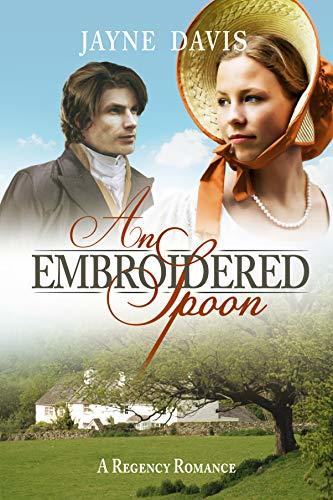
Wales 1817
After refusing every offer of marriage that comes her way, Isolde Farrington is packed off to a spinster aunt in Wales until she comes to her senses.
Rhys Williams, there on business, is turning over his uncle’s choice of bride for him, and the last thing he needs is to fall for an impertinent miss like Izzy – who takes Rhys for a yokel.
Izzy’s new surroundings make her look at life, and Rhys, afresh. But when her father, Lord Bedley, discovers that the situation in Wales is not what he thought, and that Rhys is in trade, a gulf opens for a pair who’ve come to love each other. Will a difference in class keep them apart?

"I find myself wishing to kiss you before I leave…"
Rhys Williams knew that he had no right to ask, but he could not leave without knowing if his feelings were returned. If they are, then there is nothing he would not do for Miss Isolde Farrington.
Isolde knew that she could never marry Rhys, but he was the only man who lit her up from the inside. He is the only man whom she desires to be with. Her father would not approve, but his approval did not seem to matter as she stared into the eyes of the man she was falling in love with...
From a cold and heartless banishment to Wales to the discovery of true love in the most unexpected of places, An Embroidered Spoon by Jayne Davis is what Regency Romances are all about.
Davis has presented her readers with a richly detailed and emotionally charged story that is as enthralling as it is entertaining. This is the kind of novel that once started is near on impossible to put down. It is comfortingly familiar yet as fresh and vibrant as a summer's day. With larger than life characters and an utterly beguiling plot, An Embroidered Spoon was everything I had hoped it would be, and then some.
Isolde is a woman of quick wit and a gentle disposition. However, when we first meet her, Isolde comes across as rather spoilt, arrogant and rude. However, her situation is a desperate one. Her parents expect her to marry well — they are too caught up in their quest for titles, wealth and position to take any notice of Isolde's wants and preference. For them, a good marriage is one that is based on companionship — love is not mentioned at all. But, that is not enough for Isolde. She wants everything or nothing. Her initial prejudice of Rhys, because of his seemingly lowly status, demonstrates the ignorance of the aristocracy. However, Isolde is also a very thoughtful woman and one who is willing to admit when she is wrong. Isolde is not afraid to laugh at herself, apologise for any mistakes she has made, and unlike some, she will do her very best not to repeat them. Her relationship with Rhys, a man who her father would not approve of, could be seen initially as a sort of rebellion against her parents. As the novel progresses, it becomes apparent that Isolde has fallen for Rhys, and she knows he can offer her something far more important than titles and financial stability.
Isolde was a character that I came to like very much as this novel progressed. Her dealing with the rather odious Lord Ordsall brings much humour to this story, although it is humour born out of desperation. Lord Ordsall's depiction also demonstrated the lengths a parent would go to secure what was considered a good marriage. When Isolde speaks of how Lord Ordsall forced himself on her and kissed her, Lord Bedley's, Isolde's father, immediate response was that if he had known he would have forced Lord Ordsall to marry her. He did not consider his daughter's feelings of violation at all, which I think demonstrated very clearly what it was like to be a member of the le bon ton in the 19th Century. Isolde feels trapped and who can blame her. No wonder she falls head-over-heels with Rhys who matches her not only in wit and humour but also stirs a desire which she had not felt for any other man. I thought Isolde's depiction was fabulous.
Rhys is a respectable man of trade, and because of this he really struggles with his attraction for Isolde. He knows that she is completely out of reach, and yet he cannot find the strength to stop their relationship from developing. Like Isolde, he has his own responsibilities. The story is set just after the Napoleonic war, and as a mill owner, Rhys is very conscious of the fact that times are changing. The cottage industries will be absorbed into the large mills sooner rather than later. Progress is inevitable, particularly if he wants to turn a profit, but at the same time, he is concerned for the future of the people whom his expansion will put out of work. I thought Rhys' depiction was wonderful. He is a very caring man who isn't cowed by titles or wealth, and yet he will fight for what he believes in, and he believes in his love for Isolde. Rhys is a very dashing hero with all the qualities one would expect a protagonist to have in a Regency Romance.
Secrecy and concealment are often an important theme that runs through Regency Romances, and An Embroidered Spoon is no exception to this rule. Isolde's spinster aunt, who she is banished to live with because she refuses to marry the great Lord Ordsall, isn't a spinster at all. But she is in fact married with three children. Eugenia has chosen to live the life she wanted and to marry the man of her choice without her family's consent. Eugenia has weighed heavily the merits and disadvantages of keeping her marriage a secret from her family, for she knows how they will react to her having married beneath her. If anything, Eugenia shows Isolde that despite being a woman, she can choose her own destiny. However, that decision will have consequences, and she has to be ready to sacrifice everything to be with the man she loves. Eugenia demonstrates, through her own successful and happy marriage, that sometimes the most painful of sacrifices are ultimately worth it.
As the would-be lovers become cruelly separated the Welsh Love Spoon takes on a symbolic significance as a token of affection, and it becomes a secretly embroidered message that demonstrates the love and commitment of the young protagonists. I thought this was an inspired idea on Davis' part, not to mention, incredibly romantic.
The historical setting is as rich and descriptive as a Jane Austen novel. The wildness of the Welsh countryside to the grandeur of the ballroom, are all described with a lavish sense of time and place. Davis' understanding of the industrial changes of this era also shone wonderfully through the narrative, as did her understanding of how society expected her aristocratic daughters to behave.
If you are looking for your next great Regency Romance, then look no further than An Embroidered Spoon by Jayne Davis. You won't be disappointed.
I Highly Recommend
Review by Mary Anne Yarde.The Coffee Pot Book Club.
Pick up your copy of An Embroidered Spoon Amazon UK • Amazon US
Jayne Davis
 Jayne Davis writes historical romances set in the late Georgian/Regency era, published as both ebooks and paperbacks.
Jayne Davis writes historical romances set in the late Georgian/Regency era, published as both ebooks and paperbacks.She was hooked on Jane Austen and Georgette Heyer as a teenager, and longed to write similar novels herself. Real life intervened, and she had several careers, including as a non-fiction author under another name. That wasn't quite the writing career she had in mind...
Finally, she got around to polishing up stories written for her own amusement in long winter evenings, and became the kind of author she’d dreamed of in her teens. She is now working on the first few books in the Marstone Series, set in the late Georgian/early Regency period.
You can find Jayne: Website • Pinterest • Twitter.
Published on April 12, 2020 20:00
April 11, 2020
Join #HistoricalFiction author, Mark Turnbull, as he explores what inspired him to write Allegiance of Blood #CivilWar @1642Author
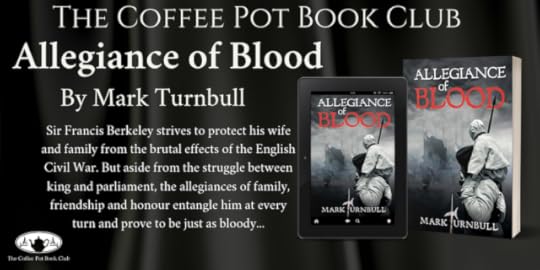
Me, My Family, & The British Civil War.By Mark Turnbull
I’ve been fascinated by the British Civil War ever since I read the first snippet of information about the period nearly thirty years ago. It was as if it had always been a part of my DNA. I also thought that the civil war had generated my desire to write. After completing my first book I discovered that writing stemmed from further back in my childhood, and regarding genetics, I certainly had a genealogical connection to the era.
When I was preparing notes for a talk that I was due to give, I opened a memory box and found some old stories that I had written. Aged six or seven, Thomas the Tank Engine – a children’s television series – was my character and inspiration! Three years after this my parents took me to Helmsley Castle in North Yorkshire and I made a chance purchase, and a chance discovery. From amongst a pack of cards, each one displaying an image of the Kings and Queens of England on one side and biographical notes on the other, I picked out my favourites and began to sketch them. After some rather bland tomb effigies, a magnificent painting of King Charles the First caught my attention. The lifelike brilliance of Van Dyck’s work and the costume sparked my interest, together with the fact that the King had been executed following a war with his own people.

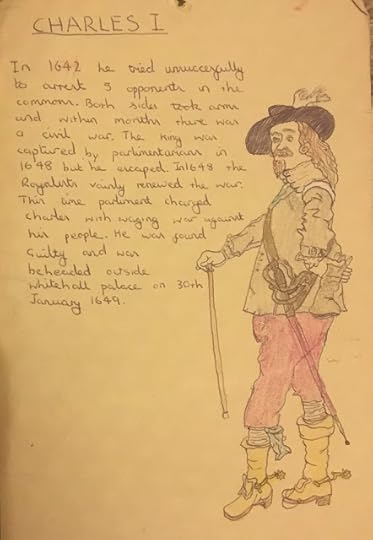
The next brush with history wasn’t long in coming. I had got up quite early, excited to have been finally allowed to explore the attic with my dad. I was positive that there would be hidden treasure up there, and as I waited for him to come downstairs that morning, I turned on the television. The film showing was ‘Cromwell’ starring Sir Alec Guinness and Richard Harris and I recognised the period immediately. Although it isn’t historically accurate, it is visually impressive and this was the treasure that I found that day. I then joined the Sealed Knot in 1996 as a re-enacting pikeman, which offered some amazing first-hand experiences of civil war battles. (The Sealed Knot and The English Civil War Society do a fantastic job of bringing this pivotal – and overlooked – period to life.)
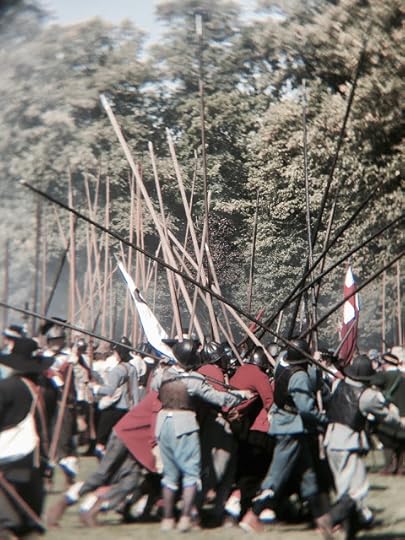
In 1999 I first had the idea to write about the British Civil War. I landed upon historical fiction without any doubts, because of my wish to bring the period, its events and characters alive. I also relished further experiencing the 17th century world by crafting a story out of its history and delving into research. Living in County Durham, fifteen miles from Newcastle, I imagined that we were quite a distance from the locations of any civil war battles, but when I was bitten by the genealogical bug, one of my goals was to see if I could find out my ancestor’s allegiance; King Charles or Parliament.
On 6th May 1646, King Charles I arrived at the headquarters of the Scottish army, near Newark upon Trent. He had come to surrender himself after just under four years of civil war. Although Scotland and England shared the same monarch, their governments were entirely separate, and the Scots had entered the conflict in support of Parliament. The King had decided that handing himself over to the Scots was the better option. Barely one week later, the Scottish army took the King north and he was imprisoned in Newe House, in Newcastle, the most prominent of the city. His servants and chaplain were sent away and he was entirely alone, surrounded by Scottish ministers who expected him to embrace their Presbyterian church and establish it in England. The King, however, was not to be moved. They had wheeled out every argument possible, cajoled and argued with him, all the while showing none of the respect or deference that he was used to. He must have considered his own family history and thought of his grandmother, Mary, Queen of Scots, who had been poorly treated by her people.

In 2005 I began researching my own family tree. At the outset, I knew nothing beyond my great-grandfather on the Turnbull side, though had been told of our Scottish origins. As I worked back generation by generation, I didn’t seem to get any nearer to Scotland; by 1604, the Turnbulls were still in Gateshead and Newcastle. There were regular entries in the parish registers of Turnbull births, marriages and deaths. Michael Turnbull, born 1604, my 9 x great-grandfather and his wife Phyllis, were the ancestors who had lived through the British Civil War. But records didn’t seem to offer any prospect of identifying Michael’s allegiance. Plus, the baptisms for Michael’s children ended in 1641. In fact, I noticed that most of the Scots had vanished from Newcastle by that point, the eve of civil war.
When King Charles was in Newcastle in 1646, besieged on all sides by Scottish clergymen, he was permitted two saving graces. He was allowed to leave the city walls and visit the shield field to play golf, and he also played chess – ironically while trying to avoid being checkmated for real. During this time the only outlet for his worries was his wife, who was safely in France. To her, he confided that, “I have need of some comfort, for I never knew what it was to be barbarously baited before … there was never man so alone as I … all the comfort I have is in thy love and a clear conscience.”Things evidently got worse fast. “I hope God has sent me hither for the last punishment that he will inflict upon me, for assuredly no honest man can prosper in these people’s company.”Despite his innermost frustration, the King had remained outwardly polite and courteous to the Scottish. While in Newcastle, he was given terms from Parliament which included abolishing episcopacy, handing control of the armed forces to them for twenty years, and also passing over fifty-six of his supporters for justice. The King declared that these terms were repugnant to his, “conscience, crown and honour.” He also began to get frustrated with the Scottish divines who on one occasion were regaling him with a long prayer of grace before mealtime. The King began eating, resolving that he would not let his food go cold while the minister, “stood whistling for the spirit.”

Meanwhile, my genealogical trail was heating up. A record proved that Michael had married for a second time, in All Saints, Newcastle, on 23rd June 1646. His wife, Violet Douglas, was the daughter of a Scottish solicitor and was sixteen years old. Michael was aged forty-one. What struck me more than the gap in age was the date and the setting. He was present in Newcastle during the King’s imprisonment, at liberty in a town tightly controlled by Scotsmen who were allied to Parliament. This was the biggest indication yet that Michael Turnbull had fought against the royalists. When writing up this article and looking into the house where King Charles was kept prisoner, it transpired that Newe House’s, “eastern entrance was on Pilgrim Street.” All Saints Church, where Michael and Violet exchanged vows, stood on the same street. I wonder, perchance, whether Michael ever saw the King heading off for golf, or if he even had any role in guarding the monarch. Despite being separated by 374 years, and also, it seems, allegiance – me being a staunch royalist – I do feel I have come to know and respect Michael. I also greatly value our family link to the momentous events of the British Civil War.
Allegiance of BloodBy Mark Turnbull
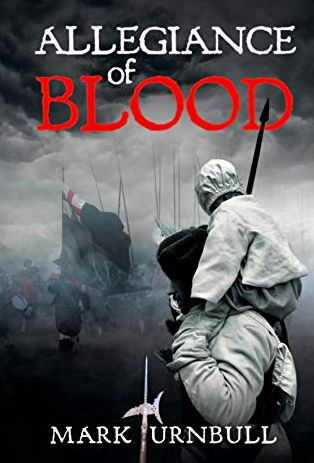
Sir Francis Berkeley strives to protect his wife and family from the brutal effects of the British Civil War. But aside from the struggle between king and parliament, the allegiances of family, friendship and honour entangle him at every turn and prove to be just as bloody.
As a witness to treason on the field of Edgehill, Francis is drawn into a fast-moving world of espionage and politics. Against a backdrop of some of the major battles and sieges, Francis’s fight to reunite his family opens up very different conflicts with which to contend.
Everything is at stake when the war comes to a little church one December morning. Can the family survive the parliamentarian onslaught as well as their own feud?
Excerpt
With large controlling hands sprawled across one of Bristol Castle’s sandstone crenellations, and his plump fingers gripping the masonry like a minister in the pulpit, Nathaniel Fiennes looked down upon his flock. His face was as square as Bristol Castle and his eyes as if they’d slid towards each ear to allow room for his broad nose. One pupil might be slightly higher than the other, but he was still Parliament’s governor, and his eyes still perceptive. He watched the cannons being removed from the ships in the harbour; the vessels’ brass hearts going on to be transplanted into church towers, behind gates and in main streets for defence.
The four turrets of Bristol Castle were regular haunts of Nathaniel’s, for up here he was closest to God. Forget the pomp of churches and the vast cathedral. It was right under the Almighty’s gaze that he felt most calm, his head at its clearest and, with Rupert’s fifteen thousand Royalists outside his gates, what better place to conduct the defence?
“Saint Mary Radcliffe’s has artillery atop the tower, sir.” Captain Bagnal praised the building’s ability to hamper any attack on the southern walls.
“It’ll do more of the Lord’s work now than it ever has.” Fiennes’ puritanism was as ingrained as the weather-beaten patterns in the stone. “In fact, I’d prefer to load the Bishop of Bristol into the muzzle for the first salvo.”
“We don’t have the Bishop, but our forts have one hundred and fifty barrels of gunpowder to feed their bellies,” Major Wood said and looked towards the two great northern hills, upon which those forts were nested.
“If only I was stocked up on soldiers too,” Fiennes replied. He lamented having half his garrison absorbed into Sir William Waller’s Parliamentarian army, which had lost them all in defeat two weeks ago. “Soldiers, to hold back the Cavalier hoards and their devilish Prince.”
“You still have two thousand brave troops under your command.” Wood barely paused. “And remarkably strong forts and earthworks. The populace is loyal, and let’s not forget, Rupert has a distinct absence of siege weaponry.”
“Do not underestimate him.” Fiennes’ own troop of horse were the ones who had experienced the first of Rupert’s famous cavalry charges.
“As long as we don’t underestimate ourselves,” Wood replied; his words as plain as his black, Puritan’s garb and short hair.
“I am a realist.” Fiennes crossed his arms. “Our walls are medieval, and the city is crossed by two rivers which will hamper the movement of our own men.” After giving his opinion that this was the hardest city in England to defend, he sent the officers back to their command points.
“The enemy are already doing battle with disease.” Wood’s manner had been prickly ever since the governor replied to Rupert’s summons to surrender. Fiennes had told the Royalists that the town could not be relinquished until he was brought to more extremes.
One of Fiennes’ forts to the north, whose palisades crowned Brandon Hill, offered a view of the ant-like enemies who had worked busily all day setting up gun posts and making probing attacks. Rupert’s men had never stopped throwing up fresh defensive positions and, from his outdated ones, Fiennes was left most apprehensive. Barely thirteen weeks of governing the city had brought him to such a state. Not that he wasn’t prepared to lay down his life for God’s cause − he wasn’t afraid − it was concern at the task before him. Nor was Bristol quite as secure from within as it should have been. He’d taken over after arresting the last governor for complicity with the King.
“You are but human, my Prince, and I have God on my side.” The only one to hear Fiennes was a crow landing on the corner of the tower with head darting one way and then the next. Its black feathers were as dark as the night that came on fast and seemed darker than most nights, as if God had averted his gaze from what was imminent. Flying over Bristol’s southern wall, the bird glided over Saint Mary Radcliffe’s, whose tolling bells pealed out a warning that the Royalist troops were on the move.
Landing just in front of the steep ditch beneath the city wall, the bird hopped around, unperturbed by the King’s Cornish soldiers, whose advance stopped as fast as it had begun, and who soon returned to their original positions. Governor Fiennes’ garrison, however, was duly kept on constant alert throughout the night, so much so that the dull, clanging bell had them wishing they could also take flight.
Pick up your copy ofAllegiance of BloodAmazon UK • Amazon US
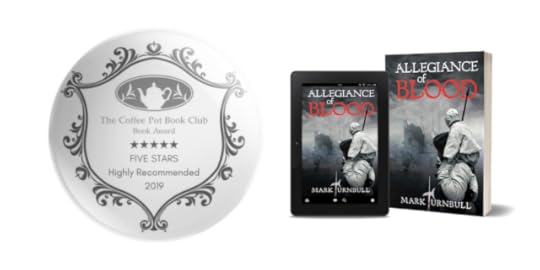
Mark Turnbull
 After a visit to Helmsley Castle at the age of ten, Mark Turnbull bought a pack of 'top trump' cards featuring the monarchs of England. The card portraying King Charles I fascinated him.
After a visit to Helmsley Castle at the age of ten, Mark Turnbull bought a pack of 'top trump' cards featuring the monarchs of England. The card portraying King Charles I fascinated him.Van Dyck's regal portrait of the King and the fact that he was executed by his own people were the beginnings of Mark's passionate interest in the English Civil War that has lasted ever since.
In the absence of time travel, he thoroughly enjoys bringing this period to life through writing. He has written articles for magazines, local newspapers and online educational sites. He has also re-enacted battles with The Sealed Knot and for several years edited the Historical Novel Society's online newsletter.
Connect with Mark: Website • Facebook • Twitter.
Published on April 11, 2020 21:30
April 9, 2020
Check out #HistoricalFiction author, Mercedes Rochelle's, fabulous new book — The King’s Retribution: Book 2 of The Plantagenet Legacy #Medieval #NewRelease @authorrochelle

The King’s Retribution:Book 2 of The Plantagenet LegacyBy Mercedes Rochelle

If you read A KING UNDER SIEGE, you might remember that we left off just as Richard declared his majority at age 22. He was able to rise above the humiliation inflicted on him during the Merciless Parliament, but the fear that it could happen again haunted him the rest of his life. Ten years was a long time to wait before taking revenge on your enemies, but King Richard II was a patient man. Hiding his antagonism toward the Lords Appellant, once he felt strong enough to wreak his revenge he was swift and merciless. Alas for Richard, he went too far, and in his eagerness to protect his crown Richard underestimated the very man who would take it from him: Henry Bolingbroke.
Pick up your copy ofThe King’s RetributionAmazon UK • Amazon US
Mercedes Rochelle
 Born in St. Louis MO with a degree from University of Missouri, Mercedes Rochelle learned about living history as a re-enactor and has been enamored with historical fiction ever since. A move to New York to do research and two careers ensued, but writing fiction remains her primary vocation. She lives in Sergeantsville, NJ with her husband in a log home they had built themselves.
Born in St. Louis MO with a degree from University of Missouri, Mercedes Rochelle learned about living history as a re-enactor and has been enamored with historical fiction ever since. A move to New York to do research and two careers ensued, but writing fiction remains her primary vocation. She lives in Sergeantsville, NJ with her husband in a log home they had built themselves.Connect with Mercedes: Website • Blog • Facebook • Twitter
Published on April 09, 2020 20:00
April 8, 2020
Join #HistoricalFiction author, Amy Maroney, as she takes a look at Pirates, Trade, and Slavery in #Medieval #Rhodes. There is also a chance to check out Amy’s fabulous books! @wilaroney

Pirates, Trade, and Slavery in Medieval RhodesBy Amy Maroney
During my deep dives into history for research on my next series, I’ve encountered one mind-boggling fact after another about life in the medieval Mediterranean. Since my new series focuses on a female artist from the Greek island of Rhodes, I’ve zoomed in on that particular place—and I’ve uncovered a treasure trove of lore about trade, pirates, and slavery.
The Christian Knights Hospitaller overtook Rhodes in the beginning of the 1300s and controlled it until the Ottoman Turks drove them out two centuries later. Under the Knights’ rule, the island became a critical trade hub for merchants hailing from western Europe, Asia, north Africa, and the Black Sea. The center of operations was Rhodes Town, a walled community dominated by the lavish Palace of the Grand Master.
 Grand Master's Palace Courtyard.
Grand Master's Palace Courtyard.Rhodes Town’s heavily fortified harbor was a bustling place, with a shipyard, housing for sailors, and administrative buildings. The Knights’ formidable navy was manned both by members of the order and mercenaries. Its fleet of vessels defended the island and conducted an eye-popping amount of piracy on Muslim ships and territories. (More on pirates in a bit.)
Trade and Merchants
The knights themselves were not allowed to profit from trade, but they still benefited by imposing taxes on trade and commerce that took place in Rhodes. They also relied heavily on loans from merchants and bankers to bankroll their operations.
Rhodes became such a key center of trade that by the 15th century, merchants from far and wide installed themselves on the island for periods of time, some going so far as to make it their permanent residence. Some of them were so favored by the knights that they received gifts of property and land from the Order. Florentine banks (including the Medici family’s bank) opened satellite branches on the island.
 Vittorio Carpaccio.
Vittorio Carpaccio.Alongside these merchants and bankers lived indigenous Greeks, Latin merchants (from Genoa, Venice, Catalonia, Florence, and Provence), a Jewish community, and Muslims. Despite the fact that the Knights were engaged in constant war with Muslim “Infidels”, in certain cases they welcomed Muslim merchants, artisans, or tradespeople to live in their midst.
Maritime trade was so pivotal to life on Rhodes that ship captains rose to positions of great prestige and influence on the island. The medieval journal of “Michael of Rhodes” shows his rise from humble origins to a position of naval leadership in Venice. Another Rhodian would go on to run Venice’s own shipyard, during a time when that Italian city-state ruled the Mediterranean Sea.
Pirates
Western history books make much of the heroic defense of Christianity by the Knights Templar and the Knights Hospitaller. Yes, Muslims pirates did attack Christians, and yes, they did enslave Christians. But the Knights weren’t just playing defense. The knights gave carte blanche to any of their members, mercenaries, or merchants who launched raiding expeditions against Turkish ships and possessions. The end result was that the two sides engaged in constant cycles of looting goods and enslaving prisoners, then ransoming captives.
 Ruins by Dominik.
Ruins by Dominik.Most of us think of pirates as anarchists who, like Jack Sparrow in the Pirates of the Caribbean movies, sail around attacking indiscriminately whenever they see a ship. In the case of Rhodes (and Cyprus and Crete, which were both colonies of Venice during the Medieval era) piracy was a state-mandated activity which benefited both the pirates and the government.
Many of the academic papers I’ve read about this feature long lists of attacks and counter-attacks by Christians and Muslims that go on for centuries. The bottom line is, both sides engaged in serious piracy. And one of the most lucrative results was the slave trade.
Slaves
Because of the aforementioned piracy and its prime location at the crossroads of Mediterranean trade, Rhodes was home to a thriving slave market. Much of what I’ve read about slavery during this period of time in the Mediterranean focuses on household slaves. On Rhodes, most household slaves were Christians. There were a few reasons for this: First, Christian slaves (especially Greeks) were cheap and plentiful. Second, Muslim slaves were often ransomed back to their home territories in exchange for Christian slaves.
Those Muslim slaves who remained on Rhodes were usually forced to do manual labor on the endless fortification of the walls around Rhodes Town. In addition, Muslim slaves lived under a harsh set of rules that their owners were required to follow to the letter. They had to be shackled every time they walked the streets, for example. They were not allowed to go to the harbor when boats were docked there, for fear they would try to escape.
Christian slaves were also much more likely than Muslim slaves to be freed. The Roman Catholic Church started pressuring Latin owners of Greek Christian slaves to free them during the 15th century, and ownership of such slaves did start declining as a result. However, records of manumitted (freed) slaves on Rhodes during that century name a number of Greeks, as well as Russians, Bulgarians, and Armenians.
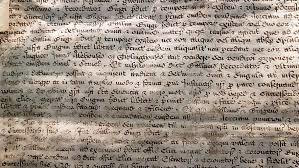
Wills show many instances of slaves being freed after a period of time. Some were freed with conditions (for example, they would have to keep living with the master or working for the master). Others were given dowries and property, even homes. Since masters often had sexual relationships with slaves, there were lots of offspring to consider when will-writing time came around. Dowries for the girls and property and cash for the boys were often written into wills by masters of such households.
Putting it all together
Not surprisingly, pirates, trade, and slavery all feature prominently in my new series. The trick is to bring these features of the medieval Mediterranean to life on the page. The resources I’ve been studying offer priceless glimpses of a brutal but also beautiful past, where people fought and died, loved and lost, just like we do today. My hope is to honor the stories of the past while creating something memorable and thrilling for contemporary readers.
The Girl from Oto
(The Miramonde Series Book 1)
By Amy Maroney

A Renaissance-era woman artist and an American scholar. Linked by a 500-year-old mystery…
The secrets of the past are irresistible—and dangerous.
1500: Born during a time wracked by war and plague, Renaissance-era artist Mira grows up in a Pyrenees convent believing she is an orphan. When tragedy strikes, Mira learns the devastating truth about her own origins. But does she have the strength to face those who would destroy her?
2015: Centuries later, art scholar Zari unearths traces of a mysterious young woman named Mira in two 16th-century portraits. Obsessed, Zari tracks Mira through the great cities of Europe to the pilgrim’s route of Camino de Santiago—and is stunned by what she finds. Will her discovery be enough to bring Mira’s story to life?
A powerful story and an intriguing mystery, The Girl from Oto is an unforgettable novel of obsession, passion, and human resilience.

Pick up your copy of The Girl from Oto
Amazon • Kobo • iBooks • Nook.
Amy Maroney
 Amy Maroney writes historical fiction about forgotten women artists. The Miramonde Series tells the thrilling story of a Renaissance-era female artist and the modern day scholar on her trail. Find The Girl from Oto, Book 1 in the trilogy, at all the major online platforms. To learn more, visit Amy’s website: www.amymaroney.com, or connect with her on Twitter @wilaroney.
Amy Maroney writes historical fiction about forgotten women artists. The Miramonde Series tells the thrilling story of a Renaissance-era female artist and the modern day scholar on her trail. Find The Girl from Oto, Book 1 in the trilogy, at all the major online platforms. To learn more, visit Amy’s website: www.amymaroney.com, or connect with her on Twitter @wilaroney.
Published on April 08, 2020 21:00
The Coffee Pot Book Club
The Coffee Pot Book Club (formally Myths, Legends, Books, and Coffee Pots) was founded in 2015. Our goal was to create a platform that would help Historical Fiction, Historical Romance and Historical
The Coffee Pot Book Club (formally Myths, Legends, Books, and Coffee Pots) was founded in 2015. Our goal was to create a platform that would help Historical Fiction, Historical Romance and Historical Fantasy authors promote their books and find that sometimes elusive audience. The Coffee Pot Book Club soon became the place for readers to meet new authors (both traditionally published and independently) and discover their fabulous books.
...more
...more
- Mary Anne Yarde's profile
- 159 followers



